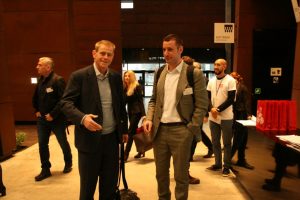 Gdansk is a bitter-sweet symbol of Poland’s fight against tyranny back in the time of Lech Walesa.
Gdansk is a bitter-sweet symbol of Poland’s fight against tyranny back in the time of Lech Walesa.
The three tall metal crosses erected over the Gdansk shipyard recall the heady days in 1980 when Solidarity, the East bloc’s first free trade union, triumphed in a trial of strength against the then communist government. Nine years later the Berlin Wall came down and the eastern half of Europe was on the march to freedom.
Gdansk also became a symbol of press freedom because among the 21 demands won by Walesa and his proletarian army was that Poland’s communist state should respect freedom of expression and press freedom. It was the workers’ demand Number 3 – coming right after the demands for free trade unions and the right to strike.
A crucial element in the showdown in Poland at that time was the power of Polish workers to spread the word to millions via underground printing presses, and even for a time to silence the stream of propaganda from state TV.
Today the European Union has said that political influence over the judiciary in Poland represents a serious threat to the rule of law. And state-run TV and radio are putting out a stream of one-sided news and comment which many believe amounts to pro-government propaganda under the direction of the right-wing Law and Justice Party.
Government-friendly figures are in charge of editorial decisions and the National Broadcasting Council and the government stand accused of attempting to censor reporting of events like the opposition protests in parliament last December. The US-owned channel TVN24 was ordered to pay a massive fine for ‘promoting illegal activities and encouraging behaviour that threatens security’ because it broadcast reports about that standoff in parliament. The station has lodged an appeal against the fine, saying its reporting was balanced and included comments from those on both sides of the dispute.
The Polish government denies breaking European standards and has openly argued that the national broadcaster must be pro-government because many private media are critical.
It is also accused of copying Russia’s example by seeking to criminalise interpretations of history which it disagrees with. The Law on National Remembrance –also known as the ‘Holocaust law’ — would make it a crime punishable by up to three years in prison to claim that the Polish Nation or the Republic of Poland played a part in Nazi crimes committed by the Third Reich.
The government is determined to stamp out the erroneous references to ‘Polish death camps’ that have sometimes surfaced in the past when talking about Nazi concentration camps in occupied Poland in World War Two. But critics say the bill would stifle proper public debates about past events.
Poland’s resistance to Nazi occupation is not in question, but there is credible evidence that crimes of violence committed by Poles against Jews in wartime were more common than has been generally realised. The bill is due to be assessed by Poland’s Constitutional Tribunal before it can become law.
At a major gathering last week of journalists, NGOs and media policy-makers in Gdansk Lech Walesa – Gdansks’ most famous son – declared that we now live in an age when ‘populism and demagoguery prevail’.
His words could apply equally to today’s Poland and to some of its near neighbours, because setbacks to press freedom and the rule of law in Poland mirror developments across much of central and eastern Europe. Some of the most worrying trends were highlighted at the Gdansk meeting.
Marton Gergely, a former editor of Népszabadság – Hungary’s best-known newspaper until it stopped publication in late 2016 amid allegations of undue government pressure – claimed that the government headed by Viktor Orban has used his Fidesz party’s two-thirds majority in parliament to ‘re-write the landscape with his own echo chamber’.
For one thing, say Gergely and other critics, that transformation has been made by forcing many German and other foreign media owners to leave Hungarian territory; for another, they have made sure that pro-govenment appointees monopolise the oversight bodies for public broadcasting.
Harlem Désir, who heads the official pan-European watchdog body, the Office of the Representative on Freedom of the Media of the Organization for Security and Cooperation in Europe, compared the situations in Poland and Hungary in other ways, too. In both states, he said, the government’s denial of public advertising — a major source of revenues– to independent or critical media has been used by politicians to bend the media to their will. In Hungary, he said, it had ‘killed’ Népszabadság. And in Poland the same tactic of denying publicly-resourced advertising was now a threat to the future of Gazeta Wyborcza — a leading newspaper whose early life was synonymous with the anti-totalitarian struggle of Lech Wales’a Solidarity movement.
Gdansk is proud of its European Solidarity Centre, a popular meeting-place which stands beside the three crosses on the grounds of the old Lenin shipyard.
Lech Walesa, now aged 75, told the assembled journalists from across Europe there that the famous victory of Solidarność was only possible then thanks to the reporting of that struggle by the world’s free media, and it happened despite the presence of a million Russian soldiers in the lands around Poland. And again today, Walesa says, freedom of the press is a vital ingredient for Poland and its neighbours if they are to overcome the new climate of populism and mistrust.
The ‘Free European Media’ conference http://freeeuropean.media/ was organised by the European Federation of Journalists and its partners in Gdansk on 15-16 February 2018.
Main photo by Arman Fazlić.

